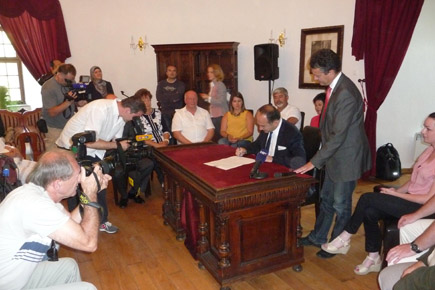
Signing of the Cigoc Declaration
© Stefan Ferger, EuronaturEuropean Stork Villages demand improved protection
Radolfzell. The 12th conference of European Stork Villages was held in Cigoc in the district of Sisak in Croatia from 25–27 June 2015. Well over 50 representatives took up the invitation from the European Stork Village of ?igo?. The conference was attended not only by the mayors and representatives of 11 different Stork Villages, but also by selected international experts on the white stork, with 13 nations represented in all. The international nature foundation EuroNatur awards the status of European Stork Village to localities that have rendered services to stork protection. In 1994, Cigoc became the first village to receive the sought after title. Now the network of European Stork Villages comprises 14 European localities.
"Over the past few years, there has been some improvement in the numbers of white stork in many European regions, but the losses of wet meadows and pastures, which are some of the white stork’s most important feeding grounds, continue to rise dramatically. We are demanding not only strict protection for these endangered habitats but also the rewilding of the wet meadows that have been destroyed," says Gabriel Schwaderer, head of the EuroNatur foundation in Cigoc. Grassland ecosystems, which include wet meadows and pastures, are amongst the most species-rich ecosystems there are. Yet the biodiversity of grassland ecosystems is increasingly endangered by the extensive use of pasture for intensive agriculture, and more than three quarters of all grassland ecosystems in the European Union have been unfavourably assessed with regard to their condition.
In the Cigoc Declaration issued at the 12th conference of European Stork Villages, both these villages and international stork experts voice their concerns about the threats that exist to the white stork. Of particular concern are the rapidly rising losses of extensively managed wet meadows and pastures that continue unabated and are having a very negative impact on the numbers of white storks in many areas. Those attending the 12th conference of European Stork Villages are urgently calling for protection for wet meadows and pastures and the rewilding of those wet meadows that have already been destroyed. The death by electrocution of countless white storks and other large birds was also condemned by the European Stork Villages, and they are demanding that, as a minimum, the existing guidelines on safeguarding electricity pylons and supply cables be implemented. Furthermore, the European Stork Villages are demanding that the plans to extend Grenchen airfield be stopped, as the stork population of the European Stork Village of Altreu (Switzerland) would be greatly endangered by this.
At a special ceremony, the mayors and official representatives of ten European Stork Villages signed an agreement to work together which commits them to providing effective protection for the white stork and its habitats in their local areas. The European Stork Villages wish to set an example of how conservation measures can be coordinated across Europe and adapted to regional needs. The measures that have already been implemented include the systematic monitoring of stork populations, the provision of bases for nest building, making safe electricity pylons and supply cables that endanger birds, preserving and re-instituting extensively managed meadows and pastures and environmental education. The experience of the European Stork Villages show that stork protection measures have a positive effect not only on white storks but on communities too, as impressive colonies of white storks attract plenty of visitors as well as more storks.
Background information:
- on the European Stork Villages campaign and the villages which have been designated a Stork Village
For further information: EuroNatur, Konstanzer Str. 22, 78315 Radolfzell, Germany,Tel.: 0049 (0)7732 - 92 72 10, Fax: 0049 (0)7732 - 92 72 22, Email: info@euronatur.org, Internet: www.euronatur.org, contact: Gabriel Schwaderer, press contact: Katharina Grund


